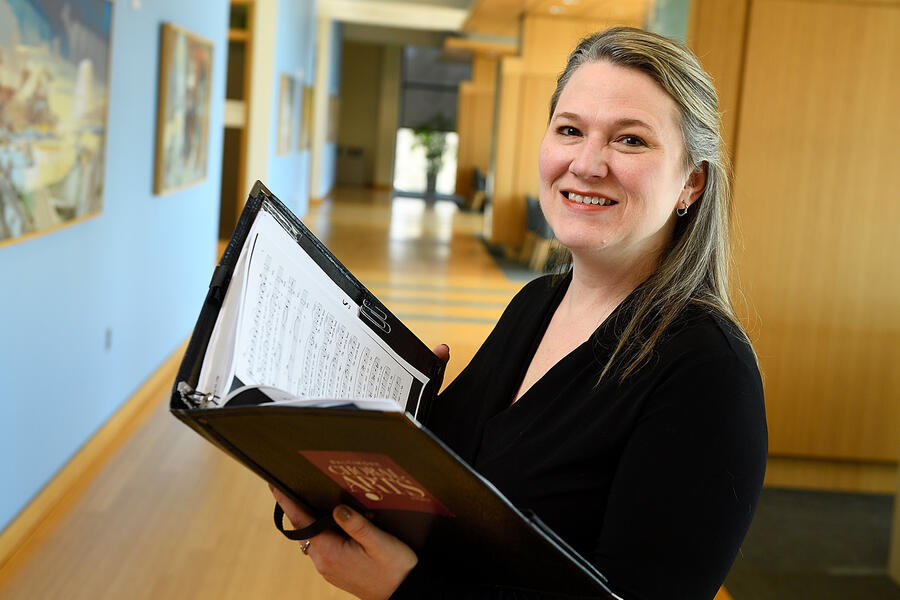My Other Life is an At Work series that lets us get to know our Johns Hopkins colleagues better. Do you or one of your co-workers have a personal passion that would make a good story? Let us know at hubatwork@jhu.edu.
Christine Collins made her singing debut when she was 3, belting out an unaccompanied solo rendition of Catch a Falling Star. Her mother captured her performance on an "incriminating cassette," she says, its whereabouts currently unknown (a fate she does not lament).
"My parents have moved at least six times since then, and nobody uses tape players anymore, so there's a good chance that it is lost to the ages," Collins says. "Not a particularly great loss to the ages, mind you."
Her singing took a serious turn when she was 12 and in the seventh grade, a commitment that has endured—and grown stronger—over 35 years. Her music teacher, having recognized her vocal talent, suggested she participate in a weeklong choral festival run by the Indianapolis Children's Choir, in the city where her family was living at the time.
That led to a successful children's choir audition followed by three years of performing with the group, until she "aged out" at 15.
"It was through that experience that I realized how much I loved—and had an aptitude for—choral classical music," she says, describing the choir as an opportunity "to have something that was truly mine" at a young age.
Classical choral singing continues to be her passion outside of work—she's partial to "the late classical and romantic eras," especially late Mozart and Brahms—and she indulges this love as a second soprano (the second highest voice range) with the Baltimore Choral Arts Society. She also serves on its board of directors. Except for a short break, she's been singing with the group since 2005, when she first attended a performance as a member of the audience.
"I just knew I had to audition for that choir," she says. "I don't know who I would be, or where I would be, or what I would be if I didn't do this," she says now with a laugh. "I'm not giving it up until somebody kicks me out."
By day she is the senior director of strategic communications for the Johns Hopkins University Carey Business School, leading one of four teams within Marketing and Communications.
She oversees the team responsible for storytelling across all platforms, handling website articles, social media, Dean's Office communications, media relations, faculty conference support, consultation on crisis communication, and ways to expand and deepen general awareness of Carey.
"We tell the story of the impact and experience of the business school," she says.
She's been at JHU nearly three years. She came from Catholic Charities of Baltimore, where she was director of communications for the organization, which has 80 programs in 200 locations across the state. Her first job in higher education was with Towson University, a shift in career after 16 years as a television news producer.
She's taken only one hiatus from singing with the Baltimore choir. It was during her last television job, when she worked in Washington between 2008 and 2013. "I couldn't get to Baltimore to make the rehearsals, so I gave it up during that time," she says. "I learned from that experience what not to give up for the sake of a job."
Still, occasionally even today, she sometimes must leave a rehearsal to handle a work matter, but it's an issue that most choir members can understand. "We are a volunteer chorus, and we all have day jobs, but our commitment is very strong," she says.
After the children's choir, she sang in high school choirs and then took four years of voice lessons when she was in college, where she majored in broadcasting but never considered making singing her professional career. "Music was my outlet, my therapy," she says. "I didn't want to make it my job."
It's important to understand that choral classical music performances are as much about the audience—maybe even more—than they are about the performers, she says.
"We don't just sing for ourselves," she says. "It is absolutely a life-shaping experience when you are fortunate enough to be a choral singer, but it's an art that requires an audience in order to survive, and I think people have forgotten how much they need live music in order to survive.
"People tend to be intimidated or turned off by choral classical music because they don't think it's something they can relate to," she adds. "But who can't relate to being moved to tears or finding themselves smiling without realizing it? Music appeals to our common humanity and lets us share an experience without having to say a word to each other, and that's powerful and healing. We as choral artists are here in, and of, and for our communities so that we can help each other celebrate, grieve, think, reflect, and rise to occasions in a way nothing can replicate."
Moreover, choral singing can impart an enduring sense of identity and a strong sense of community, both at a young age and thereafter, she says.
"The things you discover you are good at in adolescence can become really important to your mental health then and throughout the rest of your life," she says. "Discovering I could sing as an adolescent gave me a sense of my identity that no one could take away from me. Having something like that really helps to shape who you are as a person.
"For me, because it involves music—especially choral music—it's a shared perspective informed by 'community,' meaning the other performers and the greater community as a whole—the instrumentalists, the director, your audience, which is composed of your community. And music is a unifying language. Choral singing by definition is communal singing."
To that end, the organization participates in outreach concerts to make choral music more accessible to the Baltimore community and also to inspire young people, much as Collins was touched as an adolescent.
Beginning in 2017, for example, the Choral Arts Society established CoroLAB, an educational partnership with Overlea High School, and later with Eastern Technical High School, to encourage choral artistry in young singers. Baltimore Choral Arts Society members hope to expand the program to additional high schools.
The singers and music director travel to the schools to work with the students, strengthening their exposure to the art of choral music that they might not otherwise get. At times, the students perform with Baltimore Choral Arts.
In fall 2023, Choral Arts also initiated a series of early childhood music classes in partnership with the Enoch Pratt Free Library: Sing and Play with Baltimore Choral Arts.
Children from birth to age 5 and their caregivers can join free 30-minute classes, led by certified music teachers from Baltimore Choral Arts Society, for singing, creative movement, and listening to musical stories.
"Our members volunteer their time to interact with children in ways that foster their physical, intellectual, and socioemotional development," she says "Early childhood music education, particularly in underserved communities, has been proven to help children succeed when they start school, in ways such as language development, movement, and engagement with others. They all contribute to the way that young brains become wired," she says, citing several studies and other sources that demonstrate the educational benefits that music provides to young children.
The chorus performs numerous times throughout the year in Baltimore and is frequently contracted to sing with symphony orchestras in other cities, having toured parts of Europe three times during the last 20 years.
Collins' memories of transformational travel for choirs go back to 1990, when the Indianapolis Children's Choir performed as part of an international children's choral festival at Carnegie Hall in New York.
"You don't always 'get' it when you are 13, but I knew it was something special," she says.
"I have had the extraordinarily good fortune of being able to sing in some really storied venues. I went to Sydney, Canberra, and Melbourne, Australia; and Auckland, New Zealand, with the children's choir when I was 15 to perform with children's choruses in those cities, and I'm still friends with my Melbourne host family, who came to the United States eight years later and stayed with my parents for part of their visit," she says. "They call us every Christmas, and we're connected on social media.
During its 2022 tour, the Baltimore chorus sang at the historic Philharmonie Berlin, "which is legendary because it was built as an artistic representation of hope right at the Berlin Wall, where East Berliners could see it even if they couldn't access it," she says. "The original Philharmonie had been destroyed by bombs in 1942, and it took more than 20 years for music to return to an orchestral hall."
The first performance hosted in the relocated Philharmonie was Beethoven's Ninth Symphony, the final movement of which is colloquially known as the Ode to Joy, "a message, in German, of love for all without boundaries."
But the performances that move her the most are often the ones that take place in small, intimate, community venues, where the audience sits closer to the chorus, the room isn't as dark, and performances feel, to Collins, more connective.
"You can actually see the faces in the audience and how they are transformed by the music," she says. "That makes it really hard to sing around the lump in your throat."
Posted in News+Info
Tagged my other life









